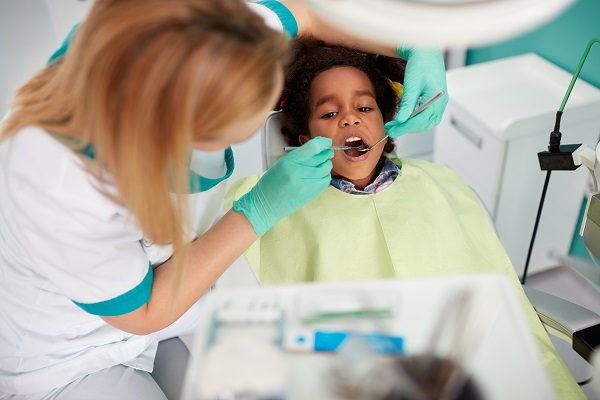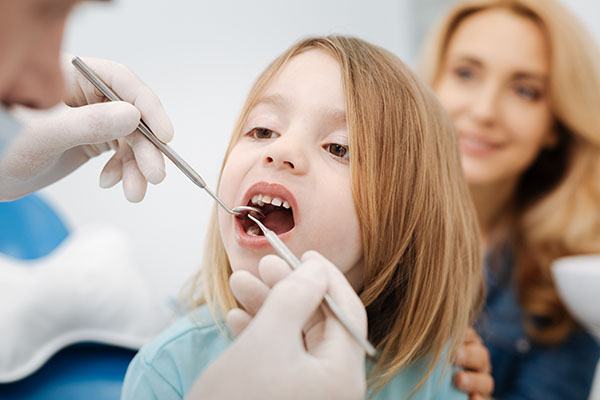When a Pediatric Dental Filling May Be Needed for Your Child

Regular pediatric dental checkups can help determine if your child needs a dental filling. Kids tend to eat more carbohydrate-rich foods. The starches and sugars tend to feed bacteria in the mouth, making them produce more acids. This results in weak enamel and cavity formation. A dental filling can restore your child’s teeth. If you want to know if your child needs pediatric dental filling, here are the details.
Dental fillings are common in children
Research shows that about 60% of children in the United States have more than one cavity by the time they reach five years old. Dental caries are tiny holes from tooth decay. It is common for kids to have cavities. These caries tend to continue until adulthood. Once the dentist determines that the child needs fillings, finding out what kind will follow.
The kinds of tooth filling for children
Dentists suggest pediatric dental fillings for kids with small cavities. Getting a dental filling is a normal procedure. It will restore a child’s tooth. It can also protect the tooth from further deterioration.
Dentists recommend white or composite fillings and silver or amalgam fillings for children. These two types of fillings can restore and protect teeth. Most patients choose composite fillings for incisors or premolars. These fillings are tooth-colored. They can blend with the neighboring natural teeth.
Baby teeth need fillings
Some parents think that primary teeth do not need that much care. After all, they will fall out anyway. Primary teeth fill the spaces permanent teeth will occupy when the time comes. These teeth must be healthy so that the permanent teeth will come out healthy as well. Baby teeth suffering from decay must receive treatment in the form of dental fillings. Early treatment will stop the growth of the cavity right away.
Without pediatric dental treatment, cavities in primary teeth will worsen. Dental caries will lead to more expensive pediatric dental treatments. The child will experience pain. The complications will affect the child’s development as well. These include difficulties in speaking and eating.
Why children are at risk for cavities
Decay wears down the enamel. This leads to the formation of cavities or tiny holes in the teeth. Bacteria cause tooth decay. It happens when starches and sugars stay on teeth for a long time.
Foods rich in these components are bread, cereals, soda, raisins, milk, and juices. Bacteria feast on these foods and produce acids. The acids combine with saliva and bacteria to form plaque. This thin, sticky substance stays on teeth and eats away the enamel. When this happens, cavities form.
Children like sugary and starchy foods. A high-sugar diet, low water intake, and low saliva flow increase a child’s risk for cavities. Encouraging them to treat sweets as treats rather than part of daily meals can reduce their intake of these foods. More fruits and vegetables will provide them with pediatric dental nutrients to maintain oral and general health.
Kids do not brush for two minutes. Most of them even skip brushing at night after a quick bedtime snack. Some children even forget to brush. Most kids choose not to floss because it is too difficult for them.
Dental anxiety could have developed during an earlier experience with a dentist. Genetic predisposition to developing cavities is also possible. These children have softer enamel. This makes them more likely to have cavities.
Preventing cavities and more pediatric dental fillings
Parents must teach good oral care at an early age. This is an important way to prevent cavities and fillings. Showing the child how to brush and floss can make it easier for the child to learn. Supervising the child while brushing and flossing can ensure the child’s proper teeth cleaning technique.
Dental appointments should happen when the child is in a good mood. A reward system can also make the visit something to look forward to. For babies, cleaning the gums every day can set the habit even before the teeth erupt. Using a small amount of low-fluoride toothpaste can result in cleaner and stronger teeth. Replacing high-sugar sweets with healthier alternatives is also a good strategy. Here are some of the teeth-friendly foods for kids:
- Granola bars
- Yogurt
- Trail mix
- Cheese sticks
- Low-glycemic fruits
- Dried fruits
- Vegetables and dips
Pediatric dental fillings can help children maintain their oral health
Children will always be at risk of developing cavities. Primary teeth can also experience tooth decay. Dental fillings can restore primary teeth to protect them until permanent teeth erupt. An appointment with your dentist can determine which type of pediatric dental filling will fit your child’s needs.
Are you considering getting a pediatric dental treatment in the Middletown area? Get more information at https://www.hvkidsmiles.com.
Check out what others are saying about our services on Yelp: Pediatric Dental in Middletown, NY.
Recent Posts
Curious about how often you should take your child to see a pediatric dentist? Read on to learn more. It is a common misconception that small children do not need to see a dentist since their baby teeth will fall out eventually. However, a number of difficulties may arise with a person's dental health at…
Cavities, or dental caries, can affect children just as they do adults, and early cavity treatment for kids is crucial to prevent further dental problems.The process of cavity treatment for kids is tailored to their unique needs and comfort. In this article, we will walk patients through the typical steps of cavity treatment for children,…
Are you wondering how often your child should see a pediatric dentist? Both children and adults should visit the dentist at least twice a year to ensure that their teeth and gums are healthy. However, seeing a pediatric dentist more often than that can be helpful to a growing child.A child’s mouth undergoes many changes…
Dentists who practice pediatric dentistry diagnose and treat dental issues in kids and teenagers. Oral health is critical at every stage of life, particularly in childhood. A common chronic condition for children is tooth decay. Dentists perform a professional cleaning on young patients' teeth to help stop cavities and prevent future problems.Before the first teeth…


